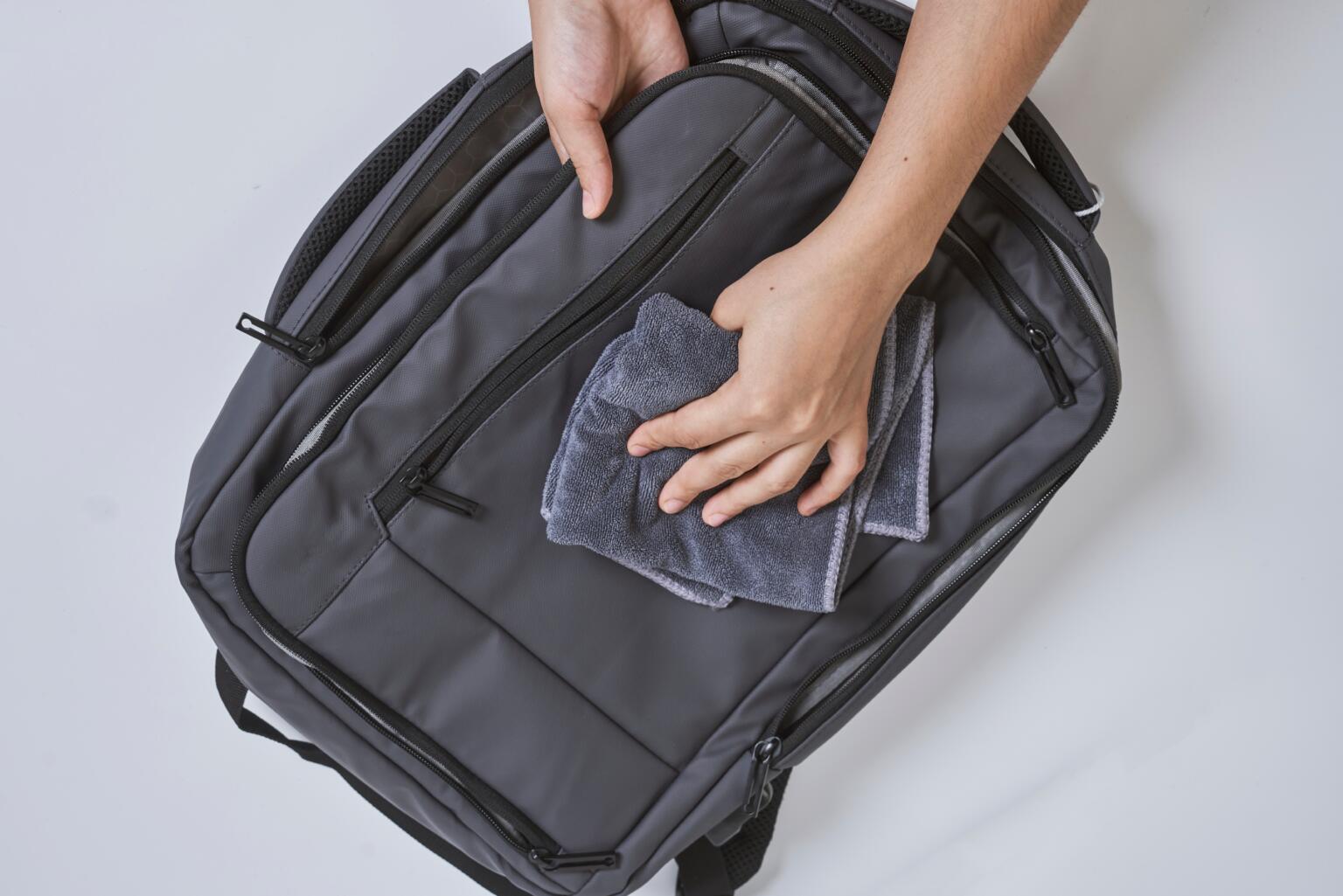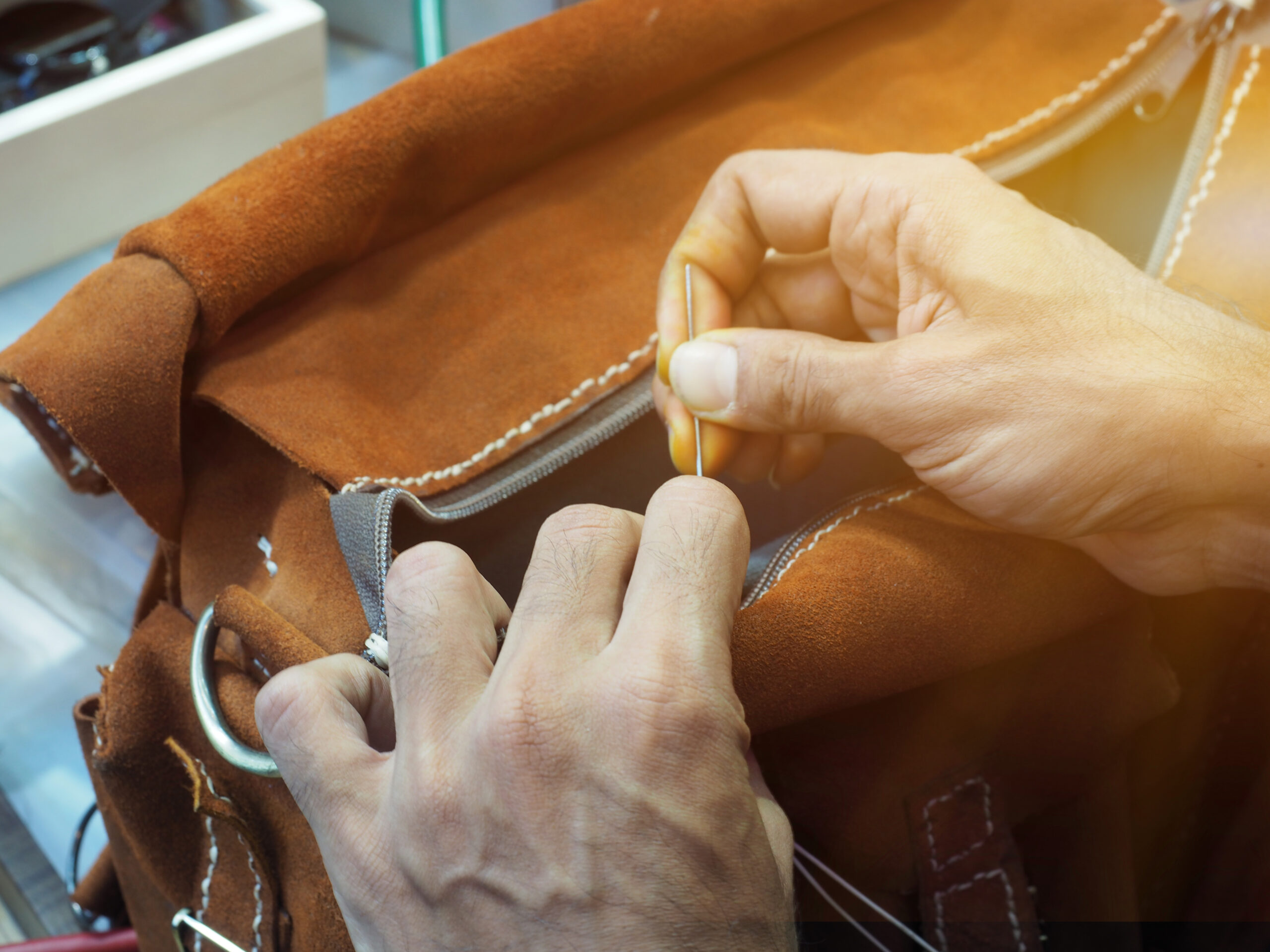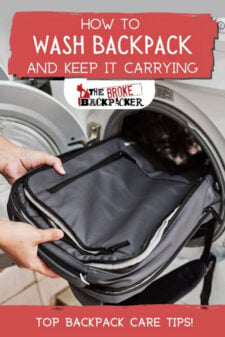Regular visitors of this blog will know that we absolutely live and breathe backpacks – the clue is kind of in the site’s name after all! As professional travellers and explorers (not to mention keen weekend hikers), we literally live out of backpacks for months at a time.
Over the last few years, I have tried countless different backpacks and reviewed well over 100. I have shared my insights about backpacks for carry-on and backpacks for camping trips. I have told you which brand makes the best day backpacks and which manufactures the best-recycled backpacks.
In today’s post, however, we are going to look at how to care for a backpack. I will share my top tips and tender tantalising tidbits on how to clean, preserve and repair your beloved backpack.

Do You Want to Travel FOREVER??
Pop your email in below to get a FREE copy of ‘How to Travel the World on $10 a Day!’.
Caring For a Backpack
Backpacks are an essential accessory for many people. Obviously, we backpackers use them extensively for travel trips. Then there are students who need to lug books around, hikers, gym bros and people who just need to carry a load of stuff around.
However, if you don’t take care of your backpack, it won’t last as long and won’t serve you as well as it should. So, if you want your backpack to stay in good shape and keep your belongings safe and secure, you need to know how to care for it properly.
Here are some tips on how to care for a backpack:
- Keep your backpack clean and dry
- Store it in a dry and cool place
- Avoid overloading it
- Repair it when necessary
- Use a waterproofing spray to keep it dry
When it comes to caring for your backpack, there are many things that you should keep in mind. Let’s answer some common questions about backpack care in a little more detail.

How Much Weight Can a Backpack Carry?
In our experience, nothing wears a backpack out faster than overstuffing it and asking it to carry more weight than it was designed to withstand.
With this in mind, you may well be wondering how much weight your backpack can carry. Well, the answer to that question depends on several factors, including the type of backpack you have (ie, lightweight backpacks are great for trekking with but can’t withstand as much of a load as heavy-duty ones can), the materials it’s made from, and the strength of the straps and other components.
The weight a backpack can carry depends on its design and construction. Generally, a backpack’s capacity is measured in litres or cubic inches, which can give you an idea of how much weight it can handle. As a rule of thumb, a backpack should not weigh more than 10% – 30% of your body weight. So if you weigh 150 pounds, your backpack should not exceed 15 pounds.
Why You Should Use Your Rain Cover
Rain covers are an important accessory for any backpack, especially if you’re going to be using it in wet conditions. Rain covers are designed to protect your backpack and its contents from water damage. Even if your backpack is made from water-resistant materials, heavy rain can still penetrate the fabric and cause your items to get wet.
Rain covers come in various sizes and styles and are easy to use. They usually have an elasticized edge that fits snugly over your backpack, keeping it dry and protected. Rain covers are also great for keeping your bag clean and free of dirt and dust that can wear a bag down quicker over time.

Can I Waterproof a Backpack?
Yes, you can waterproof a backpack using a waterproofing spray. Make sure to follow the manufacturer’s instructions and test the spray on a small area of the backpack first. Do keep in mind that waterproofing sprays may alter the appearance and breathability of the backpack’s materials.
How To Wash a Backpack
If your backpack gets dirty, you might wonder how to clean your backpack. Here are some tips on how to clean a backpack:
- Empty your backpack of all contents and shake out any loose dirt or debris.
- Use a soft-bristled brush or sponge to clean any visible stains or dirt.
- Fill a bathtub or large sink with lukewarm water and add a small amount of gentle detergent.
- Submerge the backpack in the water and gently scrub it with a brush or sponge.
- Rinse the backpack thoroughly with clean water and gently squeeze out any excess water.
- Hang the backpack to air dry, preferably in a shaded area.

Should I Wash a Backpack Using Hot Water?
No, you should absolutely not wash a backpack with hot water. Hot water can damage the backpack’s materials, zippers, and stitching. Use lukewarm water instead.
Can I Put a Backpack in the Washing Machine?
Well, it depends on the backpack’s care instructions. Some backpacks can be machine-washed, while others should only ever be hand-washed – perhaps in a bathtub or using a shower head. Check the label or the manufacturer’s website for specific care instructions. If in doubt, no!
Can I Put My Backpack in the Dryer?
Hell no! You should not put your backpack in the dryer. High heat can damage the backpack’s materials and cause it to shrink or warp. Instead, hang the backpack to air dry either outside or in a warmish room.

Now, you could spend a fat chunk of $$$ on the WRONG present for someone. Wrong size hiking boots, wrong fit backpack, wrong shape sleeping bag… As any adventurer will tell you, gear is a personal choice.
So give the adventurer in your life the gift of convenience: buy them an REI Co-op gift card! REI is The Broke Backpacker’s retailer of choice for ALL things outdoors, and an REI gift card is the perfect present you can buy from them. And then you won’t have to keep the receipt. 😉
Buy on REI!How To Repair a Backpack
When it comes to repairing your backpack, there are several things you can do to fix small tears, loose straps, or other issues.
If your backpack gets damaged, you might wonder how to repair it. Some common backpack repairs include fixing broken zippers, replacing torn or worn-out straps, and patching holes or tears. If you’re uncomfortable making the repairs yourself, you can take your backpack to a professional repair shop.
However, if your backpack has a major problem or is no longer functional, then it may well be time to replace it.
Some backpacks come with a lifetime warranty, so if you’re looking for a backpack that will last a long time, it’s worth checking out these options.

The Importance of Choosing a Quality Backpack
Not all backpacks were created equal and the truth is that the differences in quality vary massively.
Choosing a quality backpack is important for several reasons. Firstly, a quality backpack will be made from durable materials that can withstand daily wear and tear. This means that your backpack will last longer and won’t need to be replaced as frequently. Leather backpacks and bags for example will cost you a lot initially but last a hell of a long time.
Secondly, a quality backpack will be designed with ergonomics in mind, meaning that it will distribute weight evenly across your back and shoulders, reducing the risk of injury or discomfort. Hiking backpacks for example are particularly good at doing this.
Lastly, a quality backpack often comes with additional features such as pockets, compartments, and straps, making it more versatile and functional.
Do Cheap Backpacks Break Sooner Than Expensive Ones?
In general, cheap backpacks are not as durable as expensive ones. This is because cheap backpacks are often made from lower-quality materials and have less attention to detail in their construction.
However, there are some exceptions to this rule. Some cheap backpacks can be quite durable, while some expensive backpacks may not be worth the high price tag. The key is to look for a backpack that is well-made and suited to your needs. If you plan to use your backpack frequently or for heavy loads, it’s worth investing in a higher-quality backpack that will last longer.

Which Backpacks Have a Lifetime Warranty?
Many backpack manufacturers offer lifetime warranties on their products. Some examples include:
Keep in mind that lifetime warranties may have certain limitations and exclusions, so make sure to read the warranty terms carefully.
We have, of course, reviewed many backpacks by all of the manufacturers we mentioned there and here is a selection of just a few of them;
Can Backpacks Be Recycled?
Yes, many backpacks can be recycled. However, the materials and components of the backpack will determine precisely how they can be recycled. For example, backpacks made from natural materials such as cotton or hemp can be recycled into new textiles. Backpacks made from synthetic materials such as nylon or polyester can also be recycled, but the process can be more complex and is often prohibitively expensive meaning they end up in the landfill.
Some sustainable backpack manufacturers offer recycling programs for their products, so it’s worth checking with the manufacturer to see if they offer this service. Additionally, some recycling centers may accept backpacks for recycling, so it’s worth checking with your local recycling facility to see if they can accept them.
Or, you can look at upcycling your old backpack and turning it into a plant pot or a piece of concept art.

Our GREATEST Travel Secrets…
Pop your email here & get the original Broke Backpacker Bible for FREE.
Final Thoughts on How To Care For A Backpack
If you take care of your backpack, then it will take care of you and remain reliable for years of travel, hiking or simply commuting. And when the time finally does come to replace it, you know where to come to find out which backpack to buy next!
Did you find this post useful? Or maybe you have some backpack care tips of your own to share?! If so, leave a comment below and let us all know!

And for transparency’s sake, please know that some of the links in our content are affiliate links. That means that if you book your accommodation, buy your gear, or sort your insurance through our link, we earn a small commission (at no extra cost to you). That said, we only link to the gear we trust and never recommend services we don’t believe are up to scratch. Again, thank you!





